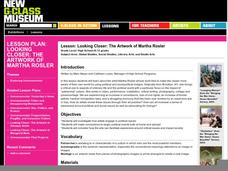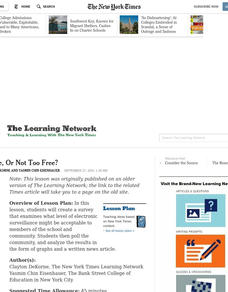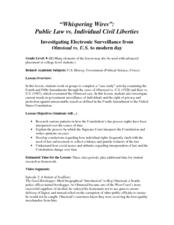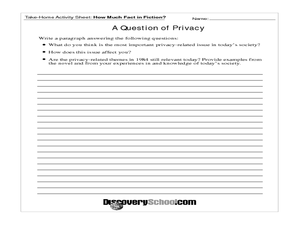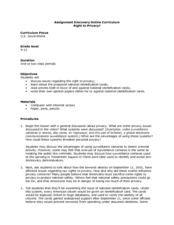The New York Times
Where to Draw the Line: Balancing Government Surveillance with the Fourth Amendment
The question of how to balance Fourth Amendment Rights with national security concerns becomes critical in an age of planned terrorist attacks, election interference, and fake news. Get young social scientists involved in the debate with...
Deliberating in a Democracy
Surveillance
Big Brother is always watching you! Scholars analyze the impact security cameras have on the legal system in a democracy. Primary documentation, case studies, and video clips investigate the use of video in prosecution and provide an...
Curated OER
Privacy in the Age of Video Surveillance: This Is Not Your Father's Candid Camera
Eighth graders examine the use of video surveillance in the corporate world and other life situations. In groups, they determine how many times and in what situations they believe they are being watched. They use the Constitution to...
Curated OER
Expanding FBI Surveillance Powers After September 11, 2001
Young scholars examine the guidelines put out by the FBI to follow during federal investigations. In groups, they discuss the decision by the FBI to increase surveillance after the terrorist attacks on September 11. They share their...
Curated OER
Lesson: Looking Closer: The Artwork of Martha Rosler
Have a class discussion to better understand the art of Martha Rosler. Young art critics consider Martha's art as it is used to express issues of political unrest and social awareness. They look at each of the five images and use the...
Curated OER
Cameras and Crime: A community keeps a lookout
Using a variety of linked sites, students find out what has happened in Collinwood (surveillance cameras installed to help eliminate crime). Students discuss when surveillance cameras could be appropriate, and when they would not be....
Curated OER
Keeping A Watchful Eye
Students explore the use of satellite surveillance systems to track criminals. They consider how the use of this technology in law enforcement might affect them and write opinions on whether or not such a system should be adopted by...
Curated OER
Too Free, Or Not Too Free?
Students create a survey that examines what level of electronic surveillance might be acceptable to members of the school and community. They poll the community, and analyze the results in the form of graphs and a written news article.
The New York Times
Big Brother vs. Little Brother: Updating Orwell's 1984
Government surveillance is an enduring conflict that has become increasingly complex with our nation's use of technology. Add to the understanding of Orwell’s 1984 by using the resources here that display the contemporary actions of Big...
Curated OER
Watch Yourself
Students consider the benefits of CCTV. In this current events lesson, students research the listed Web sites that include information about European efforts to curb antisocial behavior through surveillance. Students discuss the...
Curated OER
Right To Privacy?
High schoolers examine privacy issues. In this global issues lesson, students discuss privacy issues, surveillance cameras, and national identification cards. High schoolers conduct further research about the pros and cons related to...
Curated OER
"Whispering Wires": Public Law vs. Individual Civil Liberties
High school student love discussing controversial issues like those brought up in this fourth amendment case study. They examine the 1928 Olmstead vs. U.S. prohibition court case, applying the fourth amendment to determine whether or not...
Curated OER
Making the Future Present
Students draw and describe a new system for prison surveillance. After reading an article, they discover the use of a wearable computer by prison guards. In groups, they develop a proposal for a new type of technology to be used in a...
Curated OER
1984: How Much Fact in Fiction?
Students compare and contrast the society in Orwell's 1984 with modern society. In this 1984 lesson, students research the historical climate in which Orwell wrote the novel. Students create a comparison chart of privacy issues in the...
Curated OER
Banking for Your Future
Students get a handle on their own personal finances. They discover how banks work, how to plan and stick to a budget, and other helpful tips on managing money. They study the Federal Reserve System, which oversees the nation's banks.
Curated OER
Assignment Discovery Online Curriculum Right to Privacy?
Students explore privacy rights. In this civics lesson, students investigate the pros and cons of proposed national identification cards as they explore provided Internet links. Students write position papers pertaining to the...
Curated OER
Paedophile Ring Busted
Students discuss recent police operation. In this pedophile ring bust lesson, students consider how to be safe when on the Internet and discuss recent article. The lesson includes a series of games, questions, and activities.
Curated OER
Cuban Missile Crisis
Eleventh graders determine how causation shaped the Cuban Missile Crisis. In this Cold War instructional activity, 11th graders examine photographs and documents related to the crisis and analyze the television address that President...
Curated OER
The Alien and Sedition Acts
Learners perform research in the wake of the attacks on the World Trade Center and the Pentagon, a debate has begun over augmented security and surveillance, versus safeguards for personal freedoms. This debate is certain to occupy our...
Curated OER
CCTV: Privacy or safety?
Students read and evaluate a proposal to put CCTV in their school classrooms. Students use a highlighter pen and a map to identify places on the school campus that should have cameras to stop bullying. Students read a message from the...
Curated OER
The Alien and Sedition Acts
Students discover the conflicts that arose between the political parties over issues of foreign policy and economics. Using the Internet, they research the Alien and Sedition Acts and how they relate to the U.S. Constitution. They...
Curated OER
Right to Privacy
High schoolers examine the right to privacy as laid out in the United States Constitution. Using the text, they search the material for specific reference to protection of individual privacy. In groups, they use one provision of the...
Curated OER
Comparing the Satellite and Broadcast Radio Landscapes
Students research the development of satellite technology over the last 50 years students explain how the enactment of the Telecommunications Act of 1996 changed the rules for corporate ownership of multiple media outlets.
Curated OER
Breaking News English: Iran Resumes Nuclear Work
In this English activity, students read "Iran Resumes Nuclear Work," and then respond to 47 fill in the blank, 7 short answer, 20 matching, and 8 true or false questions about the selection.






